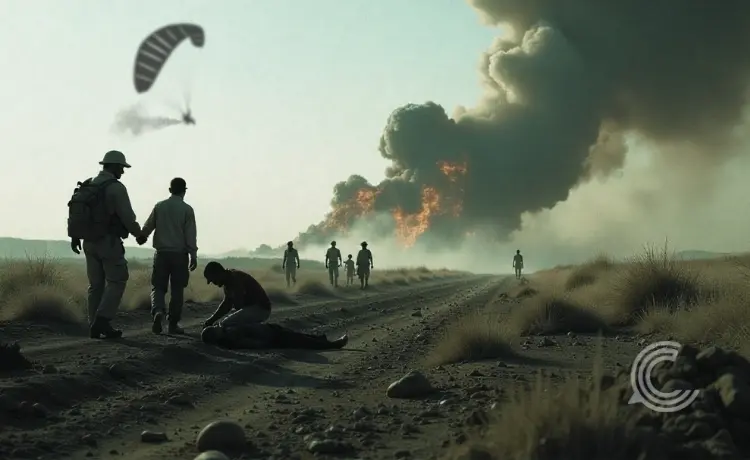24 Killed in Myanmar Paragliders Attack During Buddhist Festival

Key Highlights:
- Armed paragliders attack Chaung-U Township, killing dozens and injuring many.
- Amnesty International calls for urgent action from ASEAN and the UN.
- Conflict escalates ahead of Myanmar’s year-end elections, with civilian casualties rising.
Dozens of people were killed and many more injured after armed paragliders targeted Chaung-U Township in Myanmar on Monday night. The attacks occurred in two waves, first at 8 p.m. local time and again at 11 p.m., during a candlelight vigil marking the Thadingyut full moon festival.
Armed Paragliders Strike Chaung-U Township
Civilians were reportedly gathered to celebrate the Buddhist festival and call for the release of political prisoners. The use of motorized paragliders to drop munitions on civilian areas is a known tactic of Myanmar’s military, as reported by the UN Human Rights Office.
Amnesty International’s Myanmar researcher Joe Freeman said the attacks are part of a long pattern of military aggression dating back to the 2021 coup. “As the military attempts to solidify power with a stage-managed election later this year, it is intensifying an already brutal campaign against pockets of resistance,” Freeman added, according to the organization’s press release.
Escalating Conflict Amid Civil War
Myanmar has been embroiled in civil war since the 2021 military coup that ousted the democratically elected government. The conflict involves the military-led administration, armed opposition groups, and ethnic armed organizations.
Furthermore, the UN estimates indicate that over 75,000 people have been killed and more than 3 million displaced since the coup. Rights groups have estimated that military strikes frequently target ethnic minority civilians or communities near opposition strongholds, such as the Chaung-U Township.
Additionally, a 2024 investigation by the BBC reported that the military only controls about 20 percent of Myanmar’s territory, while armed opposition groups control roughly 40 percent. Meanwhile, the rest of the country is contested by various forces, highlighting the fragility of the political situation. As reported by a few news agencies, these attacks on civilians are designed to assert military control and intimidate populations in areas of resistance.
Calls for Stronger International Action
The military government lifted a state of emergency in July and announced elections for later this year. However, critics, including Japan’s government, have been arguing that a credible peace process must precede any political transition. Freeman of Amnesty International has urged for a stronger global intervention: “ASEAN must increase pressure on the junta and revise an approach that has failed the Myanmar people for almost five years,” he said, also calling for the UN Security Council to refer Myanmar’s situation to the International Criminal Court.
As reported by AP News, the repeated use of motorized paragliders for targeting civilian areas demonstrates a systematic strategy that lacks accountability. Humanitarian agencies warn that without external pressure, the cycle of violence is likely to continue, placing millions of civilians at risk.
Humanitarian Crisis Worsens
The attacks have intensified fears of a worsening humanitarian crisis. Civilians in conflict zones face daily threats, and access to basic services remains severely restricted. According to a recent UN report, millions in Myanmar are at risk of famine, displacement, and further violence. Additionally, experts warn that the scheduled elections cannot be free or fair while military operations continue to target civilian areas.
James Dorsey, a senior fellow at the S. Rajaratnam School of International Studies in Singapore, noted to CNA that the ongoing military campaign lacks accountability and enforcement mechanisms. “What we have is a set of principles that would guide ending the war, but no practical framework for implementation,” he said. Dorsey added that deep divisions remain between the military and opposition forces, particularly regarding civilian protection and territorial control.